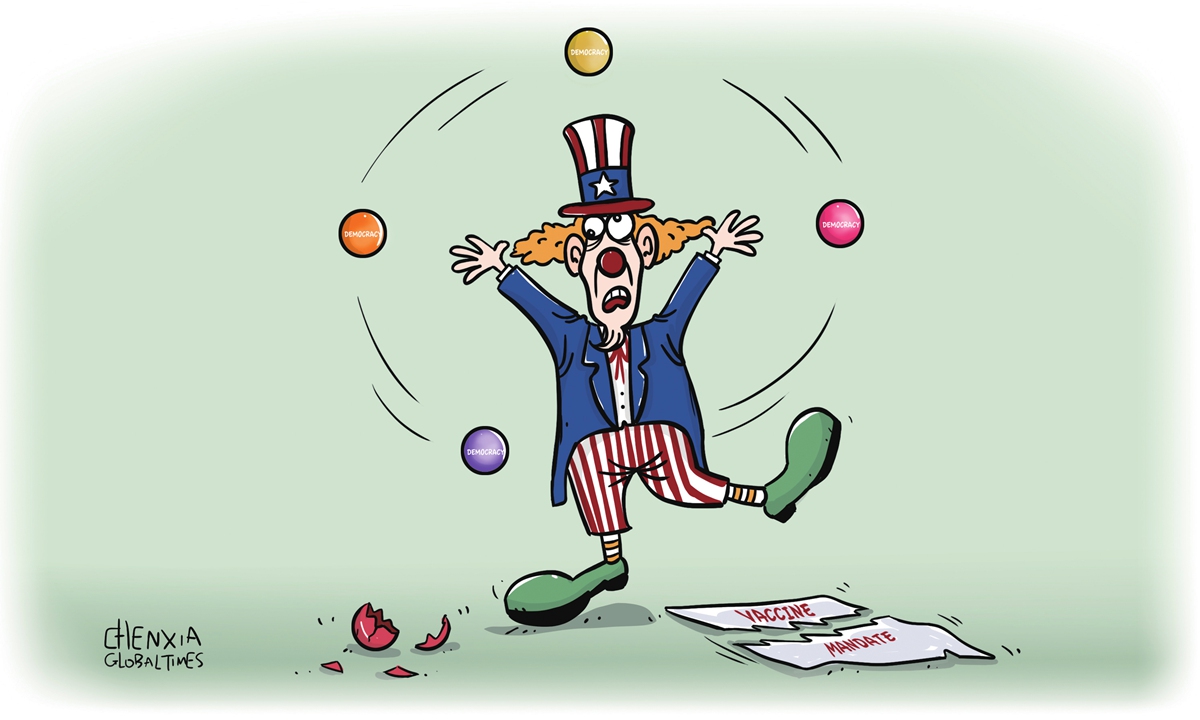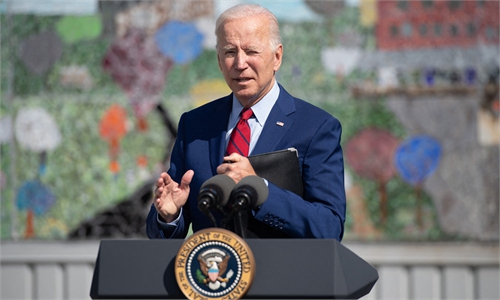
Suspension of Biden's vaccine mandate Illustration: Chen Xia/GT
The US Court of Appeals for the Fifth Circuit on Saturday suspended the Biden administration's new vaccine mandate for private companies with more than 100 employees. The decision was issued by a panel of three judges appointed by Republican presidents. This reflects the continuing partisan struggle in the US, and also the country's deepening institutional flaws.
In fact, many US laws are discretionary. Discretion is the power of officials and judges to act according to the dictates of their own judgment and conscience. Such legal discretion can be an element of checks and balances, at best. But it can also be abused as a lever for partisanship.
In this case of Biden's new vaccine mandate, existing laws don't have specific articles about the order. Therefore, it is up to the court judges to decide if the requirement is an over-step of federal authority.
Partisanship itself is indeed an original design of checks and balances in the US' democratic system. Although the intensifying partisan struggles will not affect the structural functions of the so-called US democracy, they influence the substance of the democratic system.
The two parties of the US have disputes in many spheres. Their struggles have deepened the US' domestic divisions. This political infighting is exhausting US strength in dealing with domestic and global issues. But the two parties' politicians are letting the struggles become fiercer. Why? Because they can reap profits from the infighting. They are not acting in the interests of all Americans, but are instead catering only to the interest of elite groups.
Therefore, people can see nasty consequences of the two parties' bitter struggles, including government shutdowns, mass transit stagnation, and border controls. Ordinary people's lives are certainly impacted by the two parties' struggles, yet it is the elites who are benefiting the most.
For example, former New York governor Democrat Andrew Cuomo gained wide support by fighting against Republicans; and Republican Glenn Youngkin took advantage of partisanship to win the US state of Virginia's governor race last week. Arguably, US partisan infighting benefits the wealthy minority but harms the majority. This is a defining characteristic of the US system.
Whether a system is good or not boils down to actual effects. American democracy has been led down a blind alley by partisanship. In addition to the separation of the three segments of power, there are checks and balances of the three powers. The three powers are not only separate, they are also designed to engage in mutual coordination. But many of US' problems are now characterized by extreme divisions and the no-longer-considered spirit of compromise and cooperation. American democracy is overwhelmed by current American elites' appetite for profits at all costs.
These elites know there is something wrong with the US democracy. Americans may have written reams of books reflecting on the country's problems, but the elites cannot correct the problems because the fundamental reason lies in their selfishness. So they indulge in the malpractice of partisanship and democracy.
Oftentimes when democracy and populism are combined, politicians gain more power, or more profits, than was intended in the original democratic design. So even though the elites know there will be bad consequences, they prefer to maintain or amplify the problems of the US.
With the COVID-19 death toll approaching 760,000 and vaccination rates below 60 percent, the US democratic system's faults have been unmasked. So-called autocratic China, as American elites call it, has followed the principle of administrating vaccines while people are fully informed and voluntarily get vaccinated. At present, nearly 80 percent of China's population is fully vaccinated.
This contrast reflects a fundamental difference in the purpose of governance in China and the US. The Communist Party of China is in power for the people and acting in the interests of them and their rights. But the two parties in the US are striving for the interests of the oligarchy.
Old people are the most vulnerable group from COVID-19. But China's virus prevention policies and practical moves have not given up on the elderly. This is not only a humanitarian act, but also an exercise of people-centered governance. The US, however, has abandoned a large number of elderly people during the pandemic. Although it may reduce the burden of social welfare in the future, it has come at the cost of many broken families. When American elites chose economic interest over humanitarianism, ordinary Americans have no choice but to bear more pain.
The author is an associate professor at the School of International Relations, Beijing International Studies University. opinion@globaltimes.com.cn

